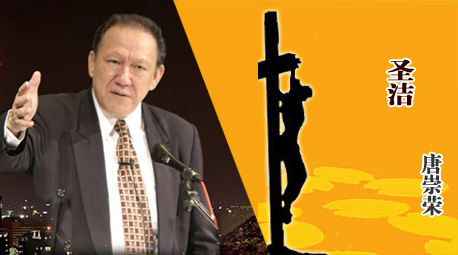 Default
Default  No Comments
No Comments Paul Washer: 你怎麼知道得救
請問耶穌是你心所渴慕的嗎?
Cong Fang读经祷告、追求圣洁、彻底奉献、传福音 |
 Default
Default  No Comments
No Comments 請問耶穌是你心所渴慕的嗎?
 Default
Default  No Comments
No Comments 
據傳,宋尚節在世工作的晚期曾對人說:“我儀表不如計志文,唱詩不如趙世光,講道不如王明道,神學不如陳崇桂,解經不如楊紹唐…但我靠主的恩典,謙卑的說:主使用我比他們多一點,因為我奉獻比他們更徹底。” 兩個歷史偉人宋尚節和王明道,如王永信牧師所說:兩個不同而又相同的人,是環繞我們的雲彩,是時代的見證人,是神的忠心僕人。
 Default
Default  2 Comments
2 Comments
唐崇榮牧師:“當復興來到的時候,聖潔是一個很重要的記號。魔鬼可以做假的方言,魔鬼可以做假的恩賜,冒充許多聖靈的工作。但是,魔鬼沒有辮法冒充聖潔。聖潔就是聖潔,真金就是真金。聖潔的生活,是不能冒充的。”
力求聖潔的宋尚節
宋尚節是在二十世紀裡被神所興起,所大用的一位極為特出的神僕。宋博士的得力秘訣有許多;其中最主要的一個,就是他力求聖潔。宋尚節有一次對同工劉乃培牧師說:「傳道人有三要:禱告、查經、自潔!」
"聖潔"是宋尚節事奉神持守的最緊的最基本心態,也是他行事為人的不變準則。每當他作自我反省時,總提到「聖潔」二字。在宋尚節的思維裡,聖潔是信徒生活與事奉的基石,也是決定一切成敗的關鍵所在!
宋尚節拙於處世,性急易開罪人,癖怪易招誤會,例如拒見過份崇敬他的人,不重交際,卻非常愛主愛人,竭力追求聖潔,討主喜悅。正因他順服、倚靠神,和不見一人只見耶穌的純潔專一的赤心,聖靈在他身上動工得特別順利,而他的工作果效也是他人望塵莫及的。
宋尚節每次講道總是猛攻罪惡。他認為罪叫人痛苦,罪叫教會荒涼,人要蒙恩,教會要復興,一定要先將罪惡除去。人知罪,有悔改,才能重生。人不重生就沒有上帝的靈。重生後有聖靈的管教,聽到聖靈的聲音,就不敢再犯罪了。他的名講章之一是「打開棺材」,就是要將罪倒空。罪被倒空,內在被聖靈充滿,見證就有能力。
宋尚節認為人生的意義就是作上帝的器皿。口才、錢財算不得甚麼,都要交給上帝。他以保羅在大馬色路上蒙恩為例,說明保羅蒙恩後作神的器皿,為神作見證,甘心背負十字架。宋尚節就以這種人生觀為主而活、為主而作、終其一生。從他的一生行事為人,可見他是把神放在首位,把十字架放在前面,把世界放在後面的人。
全方位的聖潔
 宋尚節所說的"聖潔"涵括面甚廣,不只限於思想、言語、行為不玷罪污而已;乃包含著整個基督徒人生全方位與每一個層面。例如在講道時為使聽者加深印象而形容過度,他反省時便自責自己"口不聖潔",因此不能被聖靈更大使用。甚至連作夢的內容若不滿意,也自責為不聖潔;認為那是因自己內裡不夠聖潔的原故。他所寫的工人回憶歌中有一句:「回看多年所度生活,雖是不錯,未真聖潔;受主對付,歎己敗壞。主啊!渴慕完全像你。」宋博士認為神不要我們的"不錯",神所要的是"聖潔"。正如經上所記:「那召你們的既是聖潔,你們在一切所行的事上也要聖潔。」因為經上記著說:「你們要聖潔,因我是聖潔的。」(彼前 1:15-16)
宋尚節所說的"聖潔"涵括面甚廣,不只限於思想、言語、行為不玷罪污而已;乃包含著整個基督徒人生全方位與每一個層面。例如在講道時為使聽者加深印象而形容過度,他反省時便自責自己"口不聖潔",因此不能被聖靈更大使用。甚至連作夢的內容若不滿意,也自責為不聖潔;認為那是因自己內裡不夠聖潔的原故。他所寫的工人回憶歌中有一句:「回看多年所度生活,雖是不錯,未真聖潔;受主對付,歎己敗壞。主啊!渴慕完全像你。」宋博士認為神不要我們的"不錯",神所要的是"聖潔"。正如經上所記:「那召你們的既是聖潔,你們在一切所行的事上也要聖潔。」因為經上記著說:「你們要聖潔,因我是聖潔的。」(彼前 1:15-16)
聖潔之道
宋博士說:「聖潔之道可分三段:一是潔淨自己、二是除去一切污穢、三是完全順服主。」宋博士將聖潔分為消極與積極兩方面:消極上包括(1)「潔淨自己」指向神認清一切罪污過犯;(2)「除去一切污穢」強調時時對付罪惡,不容罪污停留在自己身上。積極上則總括為:「完全順服主」,追求行在神的旨意中,遵照主所吩咐的去行。從宋博士的一生中,可以看出他願付出一切的代價去遵神的意旨而行,竭力活出一個聖潔的人生。
聖潔與能力
宋尚節認為非聖潔便不會有能力。曾有人問他:「你講道為什麼有能力?」他回答說:「因為我不斷地悔改認罪。」他說:「聖潔的人,其影子足以醫人;為人按手有能力。」他認為彼得不為金錢所迷,聖潔的手絲毫沒有不義的錢,故大有能力。宋論得靈力的秘訣強調必要追求聖潔。他認為傳道人缺乏靈力的原因是因為尚未得到潔淨。他曾如此比喻說:「電燈雖佳,然而電力未通,何益之有?」他說許多人只用「腦」講道,沒有能力。
論到自己,他仍總為自己未能發揮更大的靈力而自責;他說:「神尚未給我非常的靈力,因我尚未潔淨;若我真認罪,神必會令一切聽眾悔改認罪;若我完全聖潔,所到之處必結許多非常佳美之果。」
聖潔與靈恩
在印尼佈道時,有一對西國宣教士談及靈恩與方言的必要;宋尚節表示不讚成,他認為最重要的還是追求聖潔與愛心。由此可知宋博士雖然非常注重聖靈的工作,但並非一味的尋求某種靈恩現像如說方言之類。他認為聖潔比靈恩更重要:聖潔是根,靈恩是果,本末不能倒置。另一方面,他認定他蒙召是以佈道為主,醫病屬其次。許多人來赴會存著指望宋尚節會為他們按手禱告,醫病趕鬼;然而,宋博士卻非常清楚自己的使命,他說:「我非來醫病,在萬不得已時,才奉主名為病人禱告。」
聖潔與蒙福
宋尚節在日記中曾有這麼一個記載:計志文牧師說:「神的忠僕衛斯理約翰曾說:『如神的僕人不大大宣傳聖潔、純一、完美的道理,神不能賜福給他。』」
宋尚節向來羨佩屬靈敬虔偉人,諸如慕迪、慕安德烈、芬尼、孫大信等人的傳記是他常讀的,對衛斯理約翰他也非常敬重;他認為這些人能被神大用與賜福最主要的原因,就是他們都是神聖潔的器皿。
聖潔與美麗
宋博士在一次與人談話中,說出一句極美好的話:「屬靈的財寶即信心;屬靈的美麗即聖潔!」聖潔不單令人蒙福,並且本身就是美麗。宋尚節自認生來樣貌不佳,但他的整個人生卻極其美麗,令人欣羨!人的美醜在乎內心,聖經說:神的見證人美如雲彩(來 12:1),本是這世界不配有的(來 11:38)!善哉此言!宋尚節的聖潔生命,使他的人生美麗無比;他的見證,滿有基督馨香之氣,可以留芳百世。

聖靈重生我、愛我、復興我,那我要怎么做,心靈才可以得著潔淨呢?你說:「我禱告就更聖潔了。」沒有這回事!禱告不可能使人聖潔,正像「只要你伸出手來,你就得著拯救」的說法一樣不正確﹔是上面那雙救你的手使你得拯救,不是你的伸手使你得拯救。你懂嗎?如果上帝的手不伸出來拉你出水,就算你伸手伸得再久,也不能得拯救。全本聖經提到三樣事能叫你得潔淨:
第一,寶血潔淨我們的心
希伯來書九章14節:「基督借著永遠的靈,將自己無瑕無疵獻給神,他的血豈不更能洗淨你們的心,除去你們的死行。」所以,耶穌的實血洗淨我們的良心。
第二,真理潔淨我們的心
彼得前書一章22節:「你們既因順從真理,潔淨了自己的心。。。」「道」是很重要的,「道」隱藏著無窮無盡潔淨良心的能力。「少年人用什么潔淨他的行為呢?是要遵行你的話」(詩一一九:9)、「我將你的話藏在心里,免得我得罪你」(詩一一九:11)。耶穌說:「現在你們因我講給你們的道,已經干淨了。」(約十五:3)彼得說:「你們既因順從真理,潔淨了自己的心,以致愛弟兄沒有虛假,就當從心里彼此切實相愛。」(彼前一:22)保羅在以弗所書五章26-27節說:基督「要用水借著道把教會洗淨,成為聖潔,可以獻給自己,作個榮耀的教會,毫無玷污、皺紋等類的病,乃是聖潔沒有瑕疵的。」道可以潔淨教會,所以每次你到禮拜堂聽道,要存著這樣的心:「愿主使我因領受真道就更加聖潔,愿主使我在道的教訓中間得著成聖。」這也是耶穌基督的禱告:「求你用真理使他們成聖﹔你的道就是真理。」(約十七:17)
第三,聖靈潔淨我們的心
聖靈是住在我們里面的靈,他的工作是把他聖潔的動力運行在我們里面,就是叫基督從死里復活的大能大力運行在我們心中,乃是使我們的心思成聖、使我們的感情成聖、使我們的意志成聖。當我們全人成聖的時候,就是聖靈預備聖徒成為新婦,在聖潔中間歡迎耶穌基督再來的時候。
使徒行傳十五章記載,彼得在耶路撒冷第一次神學研討大會里作了一個結論:「我現在知道,原來上帝不偏待人,他賜聖靈給他們,正如給我們一樣﹔又借著信潔淨了他們的心,并不分我們他們。」(參:徒十五:8-9)所以,使人聖潔的三大因素是:寶血、聖道、聖靈。寶血的潔淨是真的、真理的潔淨是真的、聖靈的潔淨也是絕對真實的,因為「聖靈」是聖潔的靈。一個人被聖靈充滿而生活不聖潔,那個充滿是假的﹔因為「聖潔」的靈充滿一個人,他就要那個人過聖潔的生活,這是不能冒充的真理,教會要堅持到底。
當你看見有些一天到晚講聖靈的人做生意欺騙人、侵吞公款、充滿仇恨、沒有真理的愛、犯奸淫、對太太不忠。。。,你千萬不要相信他被聖靈充滿,因為聖潔是不能冒充的﹔撒但可以冒充各樣的恩賜和方言,但它沒有辦法成為聖潔。因為能使一個位格聖潔的,只有真理、只有寶血、只有聖靈,而撒但與這三樣無份,它所做的就是冒充現象上的充滿,和靈界的怪異現象,它沒辦法給人生命。
 Default
Default  No Comments
No Comments "聖潔的生活是一個旅程,是持續地不斷前進,是安靜地向前進發,永不中止。以諾與上帝同行。義人總是渴慕更上一層樓,因此他們不斷前進。。。"
"義人絕不會無所事事,因此他們既不會蒙頭大睡,也不會到處閒逛,而是持續不斷地向他們所渴慕的目標前進。。。"
"他們既不會匆匆忙忙,也不會擔心憂慮,更不會慌慌張張,他們鎮定自若地前行,堅定地走向天堂。。。"
"對於如何行事為人,他們從不迷惑,因為他們有完美的準則,這是他們在人生的旅程中高高興興地遵守的。。。"
"對於他們而言,主的律法絕不是令人厭煩的;上帝的誡命絕不是難以遵行的,在他們看來,律法的限制絕不是專橫的。對於他們而言,上帝的律法絕不是不可能遵行的法條:理論上讓人羨慕稱好,但實際上是荒謬難行的;他們在生活中以上帝的律法為標準,行走在上帝的律法的規模中。他們時常考察上帝的律法,並不是作為糾正他們偏行的工具,而是作為他們每日航行的航海圖,人生旅程的道路指南。"
―司布真
 Default
Default  No Comments
No Comments 摘自《失而复得的日记》
以下总结了主仆人宋尚节一生走灵程、事奉主的经历体会:
 一、建立教会的五个根基
一、建立教会的五个根基
二、爱主三级
三、论彻底认罪悔改
四、论信心
五、论灵交
六、论传道人
七、奋兴教会的秘诀
八、论苦难
九、论见证
十、论家庭礼拜
十一、论「己」
十二、论圣灵充满和恩赐
十三、论以基督的心为心
十四、论依靠主